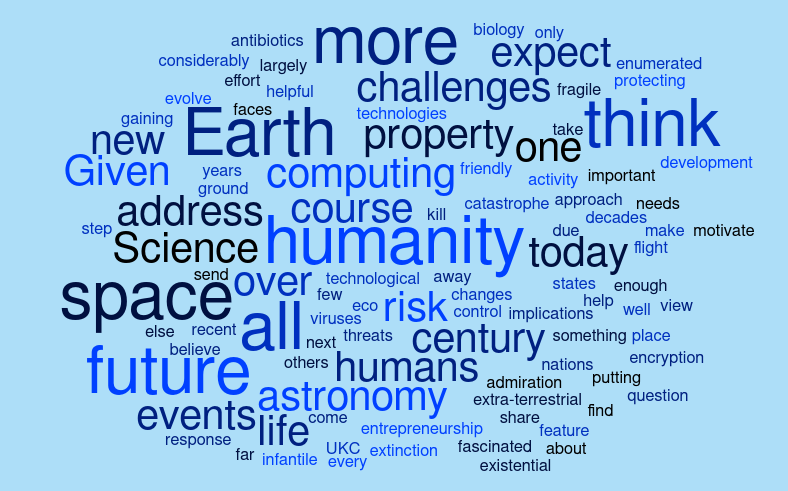Astronomer Martin Rees delivers talk for Kent’s 5th Stephen Gray Lecture
On 4 March, we welcomed Lord Martin Rees to deliver a lecture on ‘The World in 2050 – and Beyond’ for our 5th Stephen Gray Lecture for the University of Kent.
Watch the Recording
Whether you missed the live event online, or just want to rewatch the Lecture and panel-discussion, you can find the recording below. The discussion begins around 0:55:21 in this video.
Things To Think About
- Does space flight have a place in a green and eco-friendly future?
- As recent events have shown, events out of control could mean we are only one catastrophe away from extinction, and then all our humanity: with all its history and culture is gone forever! So with all our eggs in one very fragile basket (Earth), why are we not putting more effort into leaving Earth as well as protecting it?
- Dear Martin, you have raised many challenges for humanity this century. It has me thinking about our response. I would like to ask you whether you expect this to be the century of cooperation or competition? That is, will humans share their common property or compete over it?
- Should a signal from a distance civilisation be received, what would be the real scientific implications of that? Given that it may take many hundreds of years to send and receive a message, how would it affect the science which goes on today? Of course we wouldn’t necessarily be able to look at their biology, so would the search for nearer extra-terrestrial life step up considerably?
- Given that it is difficult enough to make undamaged small samples for cryo-electron microscopy due to crystallisation, is it ever going to be realistic to expect that humans can be frozen and brought ‘back’ for future technologies?
- What do you think would be the most important discovery or “perfection” of technology Martin? My ideas – sustainable biomass which would largely solve global warning, a universal vaccine for viruses & new antibiotics – but of course there will be others. What do you think needs to be developed?
- To which extent do you think we can rely on nation states to help address many of the existential threats that humanity faces, or do you believe in a more ground-up organisation to underpin the development of solutions, e.g. by entrepreneurship or social ventures?
- How helpful is a ‘risk management’ approach to address the challenges that you have enumerated? And should ethics be embedded in the protocols that manage risk today in every aspect of life?
- I am fascinated by far astronomy and defer to no-one in my admiration of the technological achievements of astronomy and space engineers but should the efforts be diverted to more immediate problems mentioned in the first part of the lecture?
- Will the collision kill us?
- Could (unusual/unexpected) changes in Solar activity feature prominently in the shape of things to come on Earth in the next few decades?
- How do you feel the rise in quantum computing will change the future of computing and encryption?
- Should we not find something else to drive and motivate us to innovate new technology than gaining ground over nations, or advancing our economy? perhaps we should evolve from this infantile view of “This is my property” “This is yours”
Join the Conversation
Carry on the conversation and continue the discussions on Twitter using the hashtags #TheWorldIn2050 #StephenGrayLecture.
We’d like to extend our thanks and appreciation again to Martin Rees for taking the time to join us, and to each of our panellists Maria Alfredsson, Robert Barker (Senior Lecturer in Chemistry and Forensic Science), Charlie Gardner (Lecturer in Conservation Science), Nigel Mason (Professor of Molecular Physics), Jennifer Tullet (Senior Lecturer in Biogerontology), and Philippe De Wilde (Professor of Natural Sciences). Stephen Gray Lectures organiser Jorge Quintanilla (Senior Lecturer in Condensed Matter Theory). Thank you also to all of our audience members and to each of you for We hope you will join us for our next Stephen Gray Lecture in 2022.

